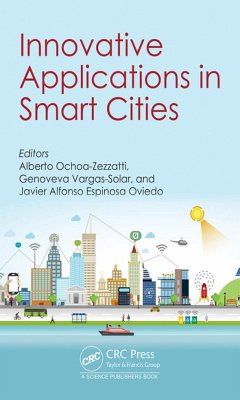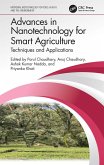Innovative Applications in Smart Cities (eBook, ePUB)
Redaktion: Ochoa, Alberto; Espinosa Oviedo, Javier Alfonso; Vargas-Solar, Genoveva
70,95 €
70,95 €
inkl. MwSt.
Sofort per Download lieferbar

35 °P sammeln
70,95 €
Als Download kaufen

70,95 €
inkl. MwSt.
Sofort per Download lieferbar

35 °P sammeln
Jetzt verschenken
Alle Infos zum eBook verschenken
70,95 €
inkl. MwSt.
Sofort per Download lieferbar
Alle Infos zum eBook verschenken

35 °P sammeln
Innovative Applications in Smart Cities (eBook, ePUB)
Redaktion: Ochoa, Alberto; Espinosa Oviedo, Javier Alfonso; Vargas-Solar, Genoveva
- Format: ePub
- Merkliste
- Auf die Merkliste
- Bewerten Bewerten
- Teilen
- Produkt teilen
- Produkterinnerung
- Produkterinnerung

Bitte loggen Sie sich zunächst in Ihr Kundenkonto ein oder registrieren Sie sich bei
bücher.de, um das eBook-Abo tolino select nutzen zu können.
Hier können Sie sich einloggen
Hier können Sie sich einloggen
Sie sind bereits eingeloggt. Klicken Sie auf 2. tolino select Abo, um fortzufahren.

Bitte loggen Sie sich zunächst in Ihr Kundenkonto ein oder registrieren Sie sich bei bücher.de, um das eBook-Abo tolino select nutzen zu können.
The book reviews different components of a Smart City in the context of diverse societies, deploy their resources and leverage their capabilities to achieve better performance of its various labor skills, marketing, social responsibility and management capacity.
- Geräte: eReader
- mit Kopierschutz
- eBook Hilfe
Andere Kunden interessierten sich auch für
![Innovative Applications in Smart Cities (eBook, PDF) Innovative Applications in Smart Cities (eBook, PDF)]() Innovative Applications in Smart Cities (eBook, PDF)70,95 €
Innovative Applications in Smart Cities (eBook, PDF)70,95 €![Advanced Green Technology for Environmental Sustainability and Circular Economy (eBook, ePUB) Advanced Green Technology for Environmental Sustainability and Circular Economy (eBook, ePUB)]() Advanced Green Technology for Environmental Sustainability and Circular Economy (eBook, ePUB)54,95 €
Advanced Green Technology for Environmental Sustainability and Circular Economy (eBook, ePUB)54,95 €![Advances in Nanotechnology for Smart Agriculture (eBook, ePUB) Advances in Nanotechnology for Smart Agriculture (eBook, ePUB)]() Advances in Nanotechnology for Smart Agriculture (eBook, ePUB)129,95 €
Advances in Nanotechnology for Smart Agriculture (eBook, ePUB)129,95 €![Human Dependence on Nature (eBook, ePUB) Human Dependence on Nature (eBook, ePUB)]() Haydn WashingtonHuman Dependence on Nature (eBook, ePUB)45,95 €
Haydn WashingtonHuman Dependence on Nature (eBook, ePUB)45,95 €![Environmental Management towards Sustainability (eBook, ePUB) Environmental Management towards Sustainability (eBook, ePUB)]() Prasad ModakEnvironmental Management towards Sustainability (eBook, ePUB)150,95 €
Prasad ModakEnvironmental Management towards Sustainability (eBook, ePUB)150,95 €![Algal Biorefinery (eBook, ePUB) Algal Biorefinery (eBook, ePUB)]() Algal Biorefinery (eBook, ePUB)43,95 €
Algal Biorefinery (eBook, ePUB)43,95 €![Introduction to Bioenergy (eBook, ePUB) Introduction to Bioenergy (eBook, ePUB)]() Vaughn C. NelsonIntroduction to Bioenergy (eBook, ePUB)152,95 €
Vaughn C. NelsonIntroduction to Bioenergy (eBook, ePUB)152,95 €-
-
-
The book reviews different components of a Smart City in the context of diverse societies, deploy their resources and leverage their capabilities to achieve better performance of its various labor skills, marketing, social responsibility and management capacity.
Dieser Download kann aus rechtlichen Gründen nur mit Rechnungsadresse in A, B, BG, CY, CZ, D, DK, EW, E, FIN, F, GR, HR, H, IRL, I, LT, L, LR, M, NL, PL, P, R, S, SLO, SK ausgeliefert werden.
Produktdetails
- Produktdetails
- Verlag: Taylor & Francis eBooks
- Seitenzahl: 282
- Erscheinungstermin: 23. September 2021
- Englisch
- ISBN-13: 9781000462265
- Artikelnr.: 62198803
- Verlag: Taylor & Francis eBooks
- Seitenzahl: 282
- Erscheinungstermin: 23. September 2021
- Englisch
- ISBN-13: 9781000462265
- Artikelnr.: 62198803
- Herstellerkennzeichnung Die Herstellerinformationen sind derzeit nicht verfügbar.
Alberto Ochoa Ortiz-Zezzatti has been a member of the faculty at University of Ciudad Juárez, Mexico since 1995. He has conducted lectures on Artificial Intelligence in undergraduate and graduate programs, and has coordinated and participated in projects funded by the European Union and Brazil, addressing topics on Smart Cities. Currently, he is engaged in a project related to forest fires until 2027. He has mentored 67 PhD students, and since 2020 he has the profile Prodep for six years and the endorsement of National System of Scientists in Mexico level 2. He has been cited around a thousand times, and has received one of the highest RG scores at his university. Genoveva Vargas-Solar (http://www.vargas-solar.com) is senior scientist at the French Council of Scientific Research (CNRS) in the Laboratory of Informatics on Images and Information Systems (LIRIS). She has been the deputy director the Franco-Mexican Laboratory of Informatics and Automatic Control (LAFMIA) an international research unit established at CINVESTAV since 2008. She is regular member of the Mexican Academia of Computing. In 2014 she obtained her Habilitation à Diriger des Recherches (HDR - tenure) from University of Grenoble, France and a PhD degree in Computer Science from the University Joseph Fourier, France (2000) and a PhD in Literature from Stendhal University, France (2005). In 1997 she obtained her first master's degree in computer science at University Joseph Fourier and in 1998 she obtained her second master's degree in Compared Literature at Stendhal University. She did her undergraduate studies on Computer Systems Engineering at Universidad de las Américas in Puebla, Mexico. Her research interests in Computer Science lies in distributed and heterogeneous databases, reflexive systems and service-based database systems. She conducts fundamental and applied research activities for addressing challenges of different architectures ARM, raspberry, cluster, cloud, and HPC. She has coordinated several research projects in Europe and Latin America financed by governments and industrial partners. She actively promotes the scientific cooperation in Computer Science between Latin America and Europe particularly between France and Mexico. Javier A. Espinosa Oviedo is a computer scientist specializing in the domains of databases and distributed systems. He currently works as postdoctoral researcher at the University of Lyon, France and is also an associate researcher of the French-Mexican Laboratory of Informatics and Automatic Control (UMI CNRS LAFMIA). Before this, he held research positions at the Delft University of Technology, the Barcelona Supercomputing Centre, and the Grenoble Informatics Laboratory. His current research interests are in big data, data-centric systems and cloud computing. He obtained his PhD in Computer Science from the University of Grenoble in 2013, and his master and bachelor's degree in Computer Science and Computer Systems Engineering, from UDLAP, in Mexico, in 2006 and 2008, respectively. He is fellow of the Mexican Academy of Computer Science (AMEXCOMP) and member of the Mexican National System of Researchers (SNI).
Segmentation of mamogram mases for smart cities health systems. Serious
Game for Caloric Burning in Morbidly Obesed Children. Intelligent
application for the selection of the best fresh product according to its
presentation and threshold of colors associated with its freshness in a
comparison of issues of a counter in a shop of healthy products in a Smart
City. Analyzing Mental Workload on Bus Drivers in the Metropolitan Area of
Querétaro and its Comparative with another three Societies to Improve the
Life in a Smart City. Multicriteria analysis of Mobile Clinical Dashboards
for the monitoring of Type II diabetes in a Smart City. Electronic
Colobliness diagnosis for the detection of color blindness and awareness in
children using images with modified figures from the Ishihara test. An
archetype of cognitive innovation as support for the development of
cognitive solutions in Smart Cities. From Data Harvesting to Querying for
Making Urban Territories Smart. Utilization of detection tools in a human
avalanche occurred in a Rugby football stadium, using multi-agent systems.
Humanitarian Logistics and the Problem of Floods in a Smart City.
Simulating Crowds at A College School in Juarez, Mexico: A Humanitarian
Logistics Approach. On the order picking policies in warehouses: algorithms
and their behavior. Color, value, price and type Koi variant specie for the
Aquaculture Industry and its continuous improvement using implicit
technology and deep learning. Evaluation of a theoretical model for the
measurement of technological competencies in the industry 4.0. Myoelectric
systems in the era of Artificial Intelligence and Big Data. Implementation
of an Intelligent Model based on Big Data and Decision Making using Fuzzy
Logic Type-2 for the car assembly industry in an industrial estate in
northern Mexico. Weibull Reliability Method for Several Fields Based Only
on the Modeled Quadratic Form.
Game for Caloric Burning in Morbidly Obesed Children. Intelligent
application for the selection of the best fresh product according to its
presentation and threshold of colors associated with its freshness in a
comparison of issues of a counter in a shop of healthy products in a Smart
City. Analyzing Mental Workload on Bus Drivers in the Metropolitan Area of
Querétaro and its Comparative with another three Societies to Improve the
Life in a Smart City. Multicriteria analysis of Mobile Clinical Dashboards
for the monitoring of Type II diabetes in a Smart City. Electronic
Colobliness diagnosis for the detection of color blindness and awareness in
children using images with modified figures from the Ishihara test. An
archetype of cognitive innovation as support for the development of
cognitive solutions in Smart Cities. From Data Harvesting to Querying for
Making Urban Territories Smart. Utilization of detection tools in a human
avalanche occurred in a Rugby football stadium, using multi-agent systems.
Humanitarian Logistics and the Problem of Floods in a Smart City.
Simulating Crowds at A College School in Juarez, Mexico: A Humanitarian
Logistics Approach. On the order picking policies in warehouses: algorithms
and their behavior. Color, value, price and type Koi variant specie for the
Aquaculture Industry and its continuous improvement using implicit
technology and deep learning. Evaluation of a theoretical model for the
measurement of technological competencies in the industry 4.0. Myoelectric
systems in the era of Artificial Intelligence and Big Data. Implementation
of an Intelligent Model based on Big Data and Decision Making using Fuzzy
Logic Type-2 for the car assembly industry in an industrial estate in
northern Mexico. Weibull Reliability Method for Several Fields Based Only
on the Modeled Quadratic Form.
Segmentation of mamogram mases for smart cities health systems. Serious
Game for Caloric Burning in Morbidly Obesed Children. Intelligent
application for the selection of the best fresh product according to its
presentation and threshold of colors associated with its freshness in a
comparison of issues of a counter in a shop of healthy products in a Smart
City. Analyzing Mental Workload on Bus Drivers in the Metropolitan Area of
Querétaro and its Comparative with another three Societies to Improve the
Life in a Smart City. Multicriteria analysis of Mobile Clinical Dashboards
for the monitoring of Type II diabetes in a Smart City. Electronic
Colobliness diagnosis for the detection of color blindness and awareness in
children using images with modified figures from the Ishihara test. An
archetype of cognitive innovation as support for the development of
cognitive solutions in Smart Cities. From Data Harvesting to Querying for
Making Urban Territories Smart. Utilization of detection tools in a human
avalanche occurred in a Rugby football stadium, using multi-agent systems.
Humanitarian Logistics and the Problem of Floods in a Smart City.
Simulating Crowds at A College School in Juarez, Mexico: A Humanitarian
Logistics Approach. On the order picking policies in warehouses: algorithms
and their behavior. Color, value, price and type Koi variant specie for the
Aquaculture Industry and its continuous improvement using implicit
technology and deep learning. Evaluation of a theoretical model for the
measurement of technological competencies in the industry 4.0. Myoelectric
systems in the era of Artificial Intelligence and Big Data. Implementation
of an Intelligent Model based on Big Data and Decision Making using Fuzzy
Logic Type-2 for the car assembly industry in an industrial estate in
northern Mexico. Weibull Reliability Method for Several Fields Based Only
on the Modeled Quadratic Form.
Game for Caloric Burning in Morbidly Obesed Children. Intelligent
application for the selection of the best fresh product according to its
presentation and threshold of colors associated with its freshness in a
comparison of issues of a counter in a shop of healthy products in a Smart
City. Analyzing Mental Workload on Bus Drivers in the Metropolitan Area of
Querétaro and its Comparative with another three Societies to Improve the
Life in a Smart City. Multicriteria analysis of Mobile Clinical Dashboards
for the monitoring of Type II diabetes in a Smart City. Electronic
Colobliness diagnosis for the detection of color blindness and awareness in
children using images with modified figures from the Ishihara test. An
archetype of cognitive innovation as support for the development of
cognitive solutions in Smart Cities. From Data Harvesting to Querying for
Making Urban Territories Smart. Utilization of detection tools in a human
avalanche occurred in a Rugby football stadium, using multi-agent systems.
Humanitarian Logistics and the Problem of Floods in a Smart City.
Simulating Crowds at A College School in Juarez, Mexico: A Humanitarian
Logistics Approach. On the order picking policies in warehouses: algorithms
and their behavior. Color, value, price and type Koi variant specie for the
Aquaculture Industry and its continuous improvement using implicit
technology and deep learning. Evaluation of a theoretical model for the
measurement of technological competencies in the industry 4.0. Myoelectric
systems in the era of Artificial Intelligence and Big Data. Implementation
of an Intelligent Model based on Big Data and Decision Making using Fuzzy
Logic Type-2 for the car assembly industry in an industrial estate in
northern Mexico. Weibull Reliability Method for Several Fields Based Only
on the Modeled Quadratic Form.







